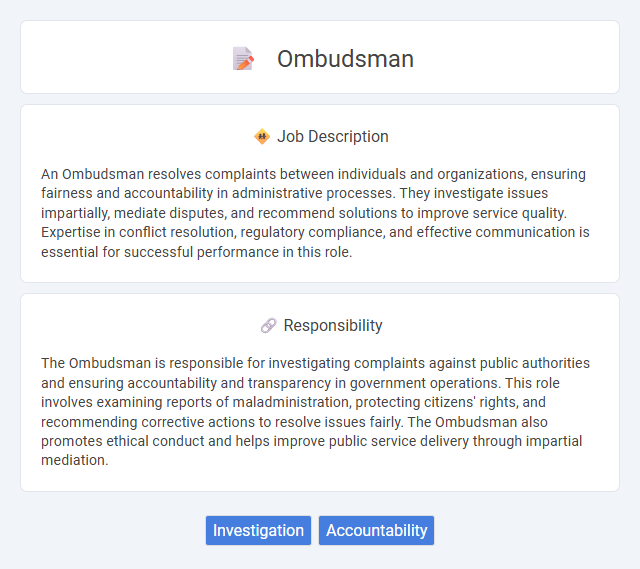
An Ombudsman resolves complaints between individuals and organizations, ensuring fairness and accountability in administrative processes. They investigate issues impartially, mediate disputes, and recommend solutions to improve service quality. Expertise in conflict resolution, regulatory compliance, and effective communication is essential for successful performance in this role.
Individuals with a strong sense of empathy and patience are likely to be well-suited for an Ombudsman role, as the job often involves addressing complaints and resolving conflicts fairly. Those who demonstrate effective communication skills and impartiality might find it easier to navigate diverse perspectives and maintain trust. Candidates who struggle with handling emotional stress or lack a diplomatic approach may find the position challenging and less fitting to their abilities.
Qualification
Ombudsman positions typically require a bachelor's degree in law, public administration, or social sciences, with many employers favoring candidates holding advanced degrees or specialized certifications in dispute resolution, mediation, or human rights. Strong communication, analytical, and conflict resolution skills are essential, along with experience in legal frameworks, government agencies, or consumer advocacy. Proficiency in handling confidential information and navigating complex regulatory environments enhances an Ombudsman's effectiveness in addressing complaints and promoting fairness.
Responsibility
The Ombudsman is responsible for investigating complaints against public authorities and ensuring accountability and transparency in government operations. This role involves examining reports of maladministration, protecting citizens' rights, and recommending corrective actions to resolve issues fairly. The Ombudsman also promotes ethical conduct and helps improve public service delivery through impartial mediation.
Benefit
The Ombudsman role likely provides significant benefits by acting as an independent mediator between the public and organizations, promoting fairness and transparency. This position probably enhances public trust in institutions and supports conflict resolution without the need for legal action. Working as an Ombudsman may also offer professional growth opportunities in problem-solving and communication skills.
Challenge
The Ombudsman job likely faces challenges related to maintaining impartiality while mediating conflicts between parties with opposing interests. Navigating complex legal and bureaucratic systems may require a deep understanding of regulations and effective communication skills. The role probably demands resilience in managing emotionally charged situations and finding equitable solutions under public scrutiny.
Career Advancement
Ombudsman professionals often experience career advancement through specialization in areas such as consumer rights, healthcare, or government affairs, enhancing their expertise and value. Gaining certification from accredited organizations like the International Ombudsman Association strengthens credibility and opens opportunities for leadership roles. Progression may lead to senior ombudsman positions, management roles, or consultancy within public and private sectors, emphasizing conflict resolution and policy development skills.
Key Terms
Investigation
An Ombudsman conducts thorough investigations to address complaints and resolve disputes between individuals and organizations. Utilizing impartial methods, the Ombudsman gathers evidence, interviews involved parties, and analyzes documentation to ensure fair and transparent outcomes. These investigations uphold accountability and promote trust in public institutions, contributing to improved governance and conflict resolution.
Accountability
An Ombudsman plays a critical role in enhancing accountability by investigating complaints against organizations or public institutions, ensuring transparency in their operations. They act as impartial mediators to resolve disputes and hold entities responsible for unfair practices or policy violations. By promoting ethical standards and enforcing compliance, Ombudsmen contribute significantly to maintaining public trust and institutional integrity.
 kuljobs.com
kuljobs.com